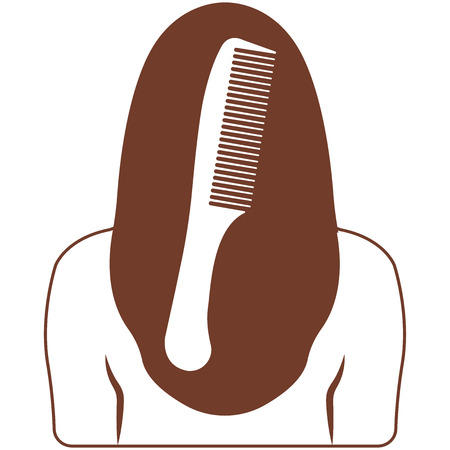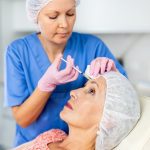1. Understanding Hair Growth: The Basics
Having fuller, healthier hair starts with understanding how hair grows and what factors influence its health. By learning about the hair growth cycle, common causes of hair thinning, and how your lifestyle choices impact hair health, you can take steps to improve your hair naturally.
The Hair Growth Cycle
Hair grows in a continuous cycle that consists of three main phases. Each strand of hair is at a different stage at any given time, which is why we don’t lose all our hair at once.
| Phase | Description | Duration |
|---|---|---|
| Anagen (Growth Phase) | This is the active growth phase where hair follicles produce new hair. The longer this phase lasts, the longer your hair will grow. | 2-7 years |
| Catagen (Transition Phase) | The hair stops growing and detaches from the follicle. This is a short transitional stage. | 2-3 weeks |
| Telogen (Resting Phase) | The old hair rests while new hair begins to form underneath. Eventually, the old hair sheds to make way for new growth. | 3-4 months |
Common Causes of Hair Thinning
If you’re experiencing hair thinning, several factors could be responsible. Some of the most common causes include:
- Nutritional Deficiencies: Lack of essential vitamins like biotin, iron, and vitamin D can weaken hair.
- Hormonal Changes: Pregnancy, menopause, and thyroid imbalances can affect the growth cycle.
- Stress: High stress levels can push more hairs into the telogen phase, leading to excessive shedding.
- Poor Scalp Health: Dandruff, buildup from products, and lack of proper cleansing can clog follicles and slow growth.
- Aging: As we age, the anagen phase shortens, leading to thinner and weaker strands.
- Chemical Damage: Frequent use of harsh dyes, heat styling tools, and chemical treatments can weaken the hair structure.
The Impact of Lifestyle on Hair Health
Your daily habits play a big role in maintaining strong and healthy hair. Here are some key lifestyle factors that contribute to better hair growth:
Nutrient-Rich Diet
A balanced diet rich in protein, omega-3 fatty acids, vitamins, and minerals supports healthy hair follicles. Foods like eggs, spinach, salmon, and nuts are great for promoting thicker hair.
Avoiding Excessive Heat & Chemicals
Lessen the use of blow dryers, straighteners, and curling irons to prevent damage. Opt for natural hairstyles whenever possible to reduce strain on your strands.
Scalp Care Routine
A clean scalp provides the best environment for healthy growth. Regularly exfoliate with gentle scrubs or natural oils like tea tree oil to remove buildup and stimulate circulation.
Sufficient Sleep & Stress Management
Poor sleep and high-stress levels can lead to hormonal imbalances that negatively impact your hair. Try relaxation techniques such as yoga or meditation to keep stress under control.
By understanding these basics about the hair growth cycle and what affects it, you’ll be better equipped to explore DIY treatments that promote stronger and fuller hair naturally.
2. Essential Nutrients for Stronger Hair
Healthy hair starts from within, and the right nutrients play a crucial role in promoting growth and strength. If youre looking to improve hair thickness and reduce shedding, incorporating key vitamins and minerals into your diet can make a big difference.
Key Vitamins and Minerals for Hair Growth
Your hair needs a combination of essential nutrients to stay strong, shiny, and healthy. Here are some of the most important ones:
| Nutrient | Benefits for Hair | Food Sources |
|---|---|---|
| Biotin (Vitamin B7) | Supports keratin production and helps prevent hair thinning. | Eggs, nuts, seeds, sweet potatoes |
| Iron | Aids in oxygen transport to hair follicles, reducing hair loss. | Spinach, red meat, lentils, tofu |
| Omega-3 Fatty Acids | Nourishes the scalp and promotes stronger hair strands. | Salmon, walnuts, flaxseeds, chia seeds |
| Zinc | Helps with tissue growth and repair, preventing excessive shedding. | Pumpkin seeds, chickpeas, beef, cashews |
| Vitamin D | Affects hair follicle cycling and helps combat hair thinning. | Sardines, mushrooms, fortified dairy products |
| Vitamin E | A powerful antioxidant that improves scalp circulation for healthier hair. | Nuts, sunflower seeds, avocados, spinach |
The Role of a Balanced Diet in Hair Health
No single nutrient will magically transform your hair overnight. A well-rounded diet rich in proteins, healthy fats, and whole foods is key to maintaining strong and vibrant locks. If you struggle to get enough nutrients from food alone, consider supplements—but always consult with a healthcare provider first.
Simple Ways to Add More Hair-Boosting Nutrients to Your Diet:
- Add a handful of nuts or seeds to your breakfast smoothie or yogurt.
- Easily boost iron intake by including leafy greens like spinach in salads or sandwiches.
- Cook meals with omega-3-rich ingredients like salmon or flaxseed oil.
- If youre low on vitamin D, spend some time outdoors or opt for fortified foods.
- Add avocado to sandwiches or as a side dish for an extra dose of vitamin E.
Nourishing your body with the right vitamins and minerals can help support healthier hair growth over time. Combine these dietary changes with DIY treatments for the best results!

3. DIY Hair Masks and Natural Remedies
Looking for a budget-friendly way to nourish and strengthen your hair? DIY hair masks made with natural ingredients can help improve hair growth while keeping your strands healthy. Using simple kitchen staples like coconut oil, aloe vera, and rosemary oil, you can create effective treatments without spending a fortune.
Benefits of Natural Ingredients
Natural ingredients provide essential nutrients that support hair growth and overall scalp health. Here are some key benefits:
| Ingredient | Benefits for Hair |
|---|---|
| Coconut Oil | Deeply moisturizes, reduces protein loss, and strengthens hair. |
| Aloe Vera | Soothes the scalp, promotes growth, and hydrates strands. |
| Rosemary Oil | Boosts circulation, stimulates follicles, and prevents thinning. |
Easy DIY Hair Masks for Growth
Coconut Oil & Aloe Vera Mask
This mask is perfect for hydrating dry hair while encouraging new growth.
Ingredients:
- 2 tablespoons coconut oil
- 1 tablespoon fresh aloe vera gel
Instructions:
- Melt the coconut oil slightly if it’s solid.
- Mix with aloe vera gel until smooth.
- Apply to scalp and hair, massaging gently.
- Leave on for 30-45 minutes before rinsing with a mild shampoo.
Aloe Vera & Rosemary Oil Scalp Treatment
This treatment helps soothe the scalp while stimulating hair follicles for better growth.
Ingredients:
- 2 tablespoons aloe vera gel
- 5 drops rosemary essential oil
- 1 teaspoon olive oil (optional for extra moisture)
Instructions:
- Mix all ingredients in a small bowl.
- Massage into your scalp using circular motions.
- Leave on for at least 20 minutes before washing out with a gentle shampoo.
How Often Should You Use These Treatments?
The frequency of use depends on your hair type:
| Hair Type | Treatment Frequency |
|---|---|
| Dry or Damaged Hair | 2-3 times per week |
| Oily Hair | 1-2 times per week |
| Normal Hair | Around once per week |
Nourishing your hair with these DIY treatments is an easy and affordable way to maintain healthy locks. By incorporating natural ingredients into your routine, you can promote stronger, fuller hair without relying on expensive products.
4. Scalp Care and Massage Techniques
Taking care of your scalp is just as important as using the right hair products. A healthy scalp promotes better blood circulation, reduces buildup, and creates the ideal environment for hair growth. Simple DIY techniques like scalp massages, exfoliation, and proper cleansing can make a big difference.
Benefits of Scalp Massages
Scalp massages are an easy and effective way to stimulate hair follicles by increasing blood circulation. Better circulation means more nutrients reach the hair roots, encouraging stronger and healthier growth.
How to Perform a Scalp Massage
- Use Your Fingertips: Gently massage your scalp in circular motions for 5-10 minutes daily.
- Add Essential Oils: Apply a few drops of rosemary or peppermint oil mixed with a carrier oil to enhance stimulation.
- Try a Scalp Massager: Use a silicone scalp brush for deeper relaxation and better exfoliation.
The Importance of Scalp Exfoliation
Exfoliating your scalp removes dead skin cells, product buildup, and excess oil that can clog hair follicles. Doing this once a week helps maintain a clean and balanced scalp.
DIY Scalp Scrub Recipe
| Ingredient | Benefit |
|---|---|
| 2 tbsp Brown Sugar | Naturally exfoliates dead skin cells |
| 1 tbsp Coconut Oil | Nourishes and moisturizes the scalp |
| 5 Drops Tea Tree Oil | Reduces dandruff and soothes irritation |
How to Use: Mix the ingredients together, gently massage onto damp scalp for 2-3 minutes, then rinse thoroughly with warm water.
Proper Scalp Cleansing Routine
Cleansing your scalp correctly helps prevent buildup that could hinder hair growth. Avoid overwashing, as stripping natural oils can lead to dryness and irritation.
Tips for Effective Cleansing
- Choose Sulfate-Free Shampoo: Harsh sulfates can dry out your scalp; opt for gentle formulas instead.
- Avoid Hot Water: Use lukewarm water to cleanse without causing dryness.
- Mildly Massage While Washing: Don’t scrub too hard—gentle massaging helps remove dirt while stimulating circulation.
- Rinse Thoroughly: Leftover shampoo residue can cause buildup; ensure you rinse well after washing.
A consistent scalp care routine combined with regular massages and proper cleansing will help create the perfect foundation for healthy hair growth.
5. Lifestyle Changes for Healthier Hair
Your daily habits play a significant role in maintaining thick, vibrant hair. Simple lifestyle changes can improve hair growth and prevent excessive shedding. Let’s explore key factors like stress management, sleep, and hydration.
Manage Stress for Stronger Hair
Chronic stress can lead to hair thinning and increased shedding. When your body is under stress, it produces more cortisol, which can disrupt the hair growth cycle. Here are some simple ways to manage stress:
- Meditation and Deep Breathing: Taking a few minutes each day to practice mindfulness can help reduce stress levels.
- Regular Exercise: Physical activity releases endorphins that combat stress and promote better circulation to the scalp.
- Hobbies and Relaxation: Engaging in enjoyable activities like reading, painting, or listening to music can keep stress at bay.
The Importance of Quality Sleep
Your body repairs and regenerates cells during sleep, including those responsible for hair growth. Poor sleep can lead to increased hair fall and slower growth. Follow these tips for better sleep:
- Aim for 7-9 Hours: Adults need sufficient sleep to support overall health, including hair strength.
- Create a Sleep Routine: Going to bed at the same time each night helps regulate your bodys internal clock.
- Avoid Screens Before Bed: Blue light from devices can interfere with melatonin production, making it harder to fall asleep.
Stay Hydrated for Healthy Hair
Your hair follicles need proper hydration to stay strong and grow efficiently. Dehydration can make your hair brittle and prone to breakage. Use this guide to track your daily water intake:
| Activity Level | Recommended Daily Water Intake |
|---|---|
| Sedentary (Minimal Activity) | 8-10 cups (64-80 oz) |
| Moderately Active (Exercise 3-4 Days/Week) | 10-12 cups (80-96 oz) |
| Highly Active (Daily Intense Workouts) | 12+ cups (96+ oz) |
If you struggle to drink enough water, try adding fruit-infused water or herbal teas to keep things interesting.
A Holistic Approach to Hair Health
A combination of stress management, quality sleep, and proper hydration can have a powerful impact on your hair’s thickness and strength. By making small yet effective lifestyle adjustments, you’ll create an environment where healthy hair thrives.
